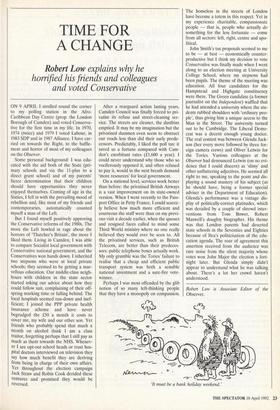TIME FOR A CHANGE
Robert Low explains why he
horrified his friends and colleagues and voted Conservative
ON 9 APRIL I strolled round the corner to my polling station in the Afro- Caribbean Day Centre (prop. the London Borough of Camden) and voted Conserva- tive for the first time in my life. In 1970, 1974 (twice) and 1979 I voted Labour, in 1983 SDP and in 1987 Alliance. I have car- ried on towards the Right, to the baffle- ment and horror of most of my colleagues on the Observer.
Some personal background: I was edu- cated with the aid both of the State (pri- mary schools and via the 11-plus to a direct grant school) and of my parents' fierce determination that their children should have opportunities they never enjoyed themselves. Coming of age in the Sixties, I fell in with the prevailing mood of rebellion and, like most of my friends and contemporaries, automatically counted myself a man of the Left.
But I found myself positively approving the Conservative reforms of the 1980s. The more the Left howled in rage about the horrors of 'Thatcher's Britain', the more I liked them. Living in Camden, I was able to compare Socialist local government with Conservative national government, and the Conservatives won hands down. I inherited two stepsons who were at local private schools; they seemed to be getting a mar- vellous education. Our middle-class neigh- bours with children in the state sector started asking our advice about how they could follow suit, complaining of their off- spring marking time or falling behind. The local hospitals seemed run-down and inef- ficient; I joined the PPP private health insurance scheme and have never begrudged the £50 a month it costs to cover me, my wife and our other son. Yet friends who probably spend that much a month on alcohol think I am a class traitor, forgetting perhaps that I still pay as much as them towards the NHS. Whenev- er I see opt-out school heads or trust hos- pital doctors interviewed on television they say how much benefit they are deriving from being in charge of their own affairs. Yet throughout the election campaign Jack Straw and Robin Cook derided these ventures and promised they would be reversed.
After a rearguard action lasting years, Camden Council was finally forced to pri- vatise its refuse and street-cleaning ser- vice. The streets are cleaner, the dustbins emptied. It may be my imagination but the privatised dustmen even seem to obstruct our roads less than did their surly prede- cessors. Predictably, I liked the poll tax: it saved us a fortune compared with Cam- den's exorbitant rates (£1,600 a year). I could never understand why those who so vociferously opposed it, and often refused to pay it, would in the next breath demand 'more resources' for local government.
On a national level, services work better than before: the privatised British Airways is a vast improvement on its state-owned version. When I went recently to the Pass- port Office in Petty France, I could scarce- ly believe how much more efficient and courteous the staff were than on my previ- ous visit a decade earlier, when the queues and resigned faces called to mind some Third World ministry where no one really believed they would ever be seen to. All the privatised services, such as British Telecom, are better than their predeces- sors: public telephone boxes actually work. My only grumble was the Tories' failure to realise that a cheap and efficient public transport system was both a sensible national investment and a sure-fire vote- winner.
Perhaps I was most offended by the glib notion of so many left-thinking people that they have a monopoly on compassion.
The homeless in the streets of London have become a totem in this respect. Yet in my experience charitable, compassionate people — that is, people who actually do something for the less fortunate — come from all sectors: left, right, centre and apo- litical.
John Smith's tax proposals seemed to me to be — at best — economically counter- productive but I think my decision to vote Conservative was finally made when I went along to an election meeting at University College School, where my stepsons had been pupils. The theme of the meeting was education. All four candidates for the Hampstead and Highgate constituency were there. The Green candidate (a former journalist on the Independent) waffled that he had attended a university where the stu- dents rubbed shoulders with 'ordinary peo- ple', thus giving him a unique access to the Man in the Street. The university turned out to be Cambridge. The Liberal Demo- crat was a decent enough young doctor. The real contest wa,s between Glenda Jack- son (her every move followed by three for- eign camera crews) and Oliver Letwin for the Tories. Various colleagues at the Observer had denounced Letwin (on no evi- dence that I could discern) as 'slimy' and other unflattering adjectives. He seemed all right to me, speaking to the point and dis- playing a sound mastery of his subject (as he should have, being a former special adviser in the Department of Education). Glenda's performance was a vintage dis- play of politically-correct platitudes, which was derailed by a couple of shrewd inter- ventions from Tom Bower, Robert Maxwell's doughty biographer. His theme was that London parents had deserted state schools in the Seventies and Eighties because of Ilea's politicisation of the edu- cation agenda. The roar of agreement this assertion received from the audience was rare noise from the silent majority whose votes won John Major the election a fort- night later. But Glenda simply didn't appear to understand what he was talking about. There's a lot her crowd haven't understood.
Robert Low is Associate Editor of the Observer.
'It must be a bank holiday weekend.'


















































 Previous page
Previous page